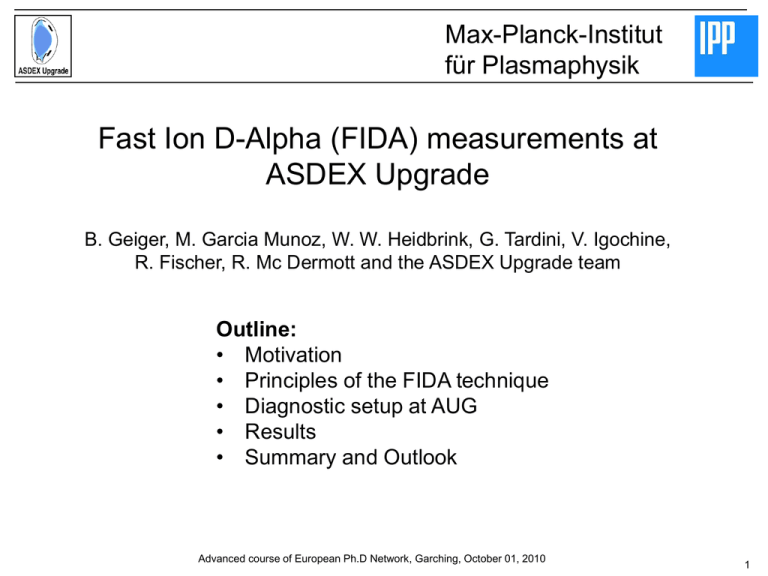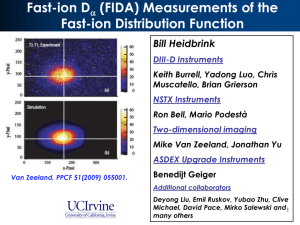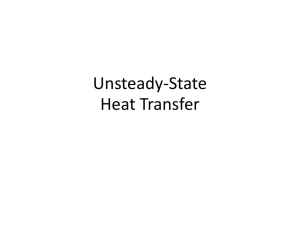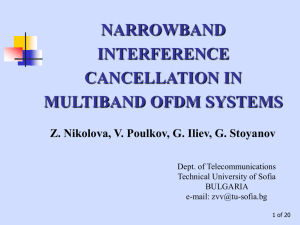Summary and outlook
advertisement

Max-Planck-Institut für Plasmaphysik Fast Ion D-Alpha (FIDA) measurements at ASDEX Upgrade B. Geiger, M. Garcia Munoz, W. W. Heidbrink, G. Tardini, V. Igochine, R. Fischer, R. Mc Dermott and the ASDEX Upgrade team Outline: • Motivation • Principles of the FIDA technique • Diagnostic setup at AUG • Results • Summary and Outlook Advanced course of European Ph.D Network, Garching, October 01, 2010 1 Motivation - Fast-ions in fusion plasmas Fast-ion sources • 3.5 MeV α-particles produced in thermonuclear reactions • NBI & ICRF heating Fast-ion confinement essential for • Heating and current drive efficiency • Safety operation; First wall damage Fast-ion redistribution/loss mechanisms • Prompt fast-ion losses of NBI, ICRH and fusion origin • Magnetic field configuration e.g. ripple • Anomalous transport; ELMs, Microturbulence and MHD; vfast > v Alfven 2 The 6D distribution function of fast ions (reduced to 3D) Simulated by TRANSP pitch of NBI Simulated by TRANSP Pitch v||/vtotal (Projection the velocity vector on the magnetic field) Fast Ion D-Alpha (FIDA) technique enables to observe a part of the distribution function explored by W. W. Heidbrink, DIIID, 2004 3 Overview • Motivation • Principles of the FIDA technique • Diagnostic setup at AUG • Results • Summary and Outlook 4 Observation of Balmer alpha light: λ0=656.1, n=3-2 • • Fast ions are neutralized by charge exchange reactions along NBI (localization of the measurement) Dα emission (n=3-2) with λ0=656.1 nm + shift pitch 2 E / m 0 c Energy 20keV 60keV 100keV ΔλDoppler, α=0° 3.03 nm 5.26 nm 6.80 nm 5 FIDA radiance IFIDA contains information on the density nfast ions I FIDA nn 3 fast neutrals E32 dl dl : Integration along a given line of sight E3→2: Transition probability from n=3 to n=2: Einstein coefficient nn3 fast neutrals n fast ions nn,beam CX ( n3) vbeam vbeam n beam + Decay from higher n-states + Excitation from lower n-states by electron/ion impact nbeam:Density of injected neutrals with full, half, and third energy (species mix) and Halo neutrals: Cloud of thermal neutrals around NBI, produced by charge reactions between injected neutrals and thermal D-ions. σCX: Cross section for charge exchange vbeam:relative velocity between fast ions and beam neutrals 6 Interpretation of FIDA measurements FIDA measurements are difficult to unfold Forward model to check theoretical distribution function FIDASIM code (Heidbrink, DIIID) : • • • Monte Carlo code using a 3D grid 3D density profiles of beam neutrals nbeam (injected and halo neutrals) Artificial FIDA spectra representing a theoretical fast ion distribution function (e.g. from TRANSP) Inputs: Calculation: • • • • • • Fast ion distribution function (TRANSP) Atomic rates and cross sections Kinetic profiles (Te, ne, Ti, ni, vtor…) Equilibrium Geometry • • • Attenuation of injected NBI neutrals and generation of Halo neutrals Probability for charge exchange reactions of fast ion Collisional radiative model along path of a fast neutral FIDA spectra (Doppler, Stark Effect) 7 FIDA emission must be separated from other spectral contributions Active D-Alpha components: • • • FIDA Beam emission: injected neutrals get excited and emit D-alpha radiation. Shape determined by species mix, Doppler shift and Stark splitting Halo emission: Halo neutrals are thermally distributed. Their emission can be approximated with a Gaussian curve. Passive: • • Edge D-alpha: very intense passive radiation of D atoms at the edge Impurity line radiation • Bremsstrahlung: Radiation from the whole plasma. Flat shape in spectra but limits FIDA technique to low densities and Zeff 8 Overview • Motivation • Principles of the FIDA technique • Diagnostic setup at AUG • Results • Summary and Outlook 9 Existing CXRS diagnostic (CER) used for FIDA measurements! • Focused on 60kV source NBI 3 • Movable grating, 2400l/mm • CCD camera (PI) operated in • 25 tangential lines of sight frame transfer mode • 400 µm fibers • ~9nm spectral range 10 PASSIVE ACTIVE D-Alpha D-Alphaspectra spectraat atAUG AUG Measurement! BEAM emission edge core 11 Example of typically observed active and passive spectra • 10 ms exposure time • instrument function of ~0.2 nm (200µm entrance slit) • 661.0nm central wavelength CII Tungsten coating very good for FIDA: • Clean spectra thanks to small low Z-impurity concentrations (e.g. C) Background can be estimated as a flat line (Bremsstrahlung) Continuous FIDA measurements possible! (Beam modulation not necessary) 12 Radial FIDA profiles • Radial FIDA profiles can be calculated by integrating over a given wavelength range for every line of sight • Relative small and offset-like uncertainty when estimating background with a flat line 13 Weighting function Which part of the phase space is observed? Weighting function (rho=0.18) • Doppler effect • Stark effect (9 components) • Charge exchange cross section into n=3 state 14 Fast ions injected by the AUG NBI sources can be observed 60kV 60kV+93kV 60kV+93kV Product of distribution function with weighting function (λ=659.5-660.5 nm) 15 Overview • Motivation • Principles of the FIDA technique • Diagnostic setup at AUG • Results • Summary and Outlook 16 FIDA technique resolves off- and on-axis NBI heating #25698: Fast ions by NBI 6 and NBI 8 in addition to NBI 3 On axis (NBI8) Off axis (NBI6) Integration from λ=659.5 to 660.5 nm 17 Comparisons to the FIDASIM code: #25528 • • • Low density On-and off-axis heating by NBI 8 and NBI 6 Continuous and modulated heating with NBI 3 18 Simulated (FIDASIM) and measured FIDA spectra FIDA, Simulation FIDA, Simulation Multiplied by 1.3! 19 Simulated and measured FIDA profiles Good agreement is found between TRANSP predicted classical FIDA profiles (classical fast ion distribution) and the measured profiles in MHD quiescent plasmas. Analysis with beam modulation: Technical problem of NBI with acceleration voltage and divergence when modulating Clear off axis contribution visible but deviances in the plasma center 20 Beam emission shows that NBI 3 does not inject with full power and energy • Intensity of Beam emission lower than 50% when modulating (reduced power) • Shift of Beam emission indicates that NBI 3 operates with reduced voltage (less than 60kV) 21 Sawtooth like crash at ~0.565s • • Crash at 0.565s shown by neutrons rate and Te NBI 3 fuelling continuously 22 Sawtooth like crash observed by Soft X-Ray Inversion radius at rho ~0.4 23 Sawtooth like crash caused by the collapse of a double tearing mode Z. Chang et al, ’Off-axis sawteeth and doubletearing reconnection in reversed magnetic shear plasmas in TFTR’, 1996 Phys. Rev. Lett. 77, 3553 24 Fast ions are moving outwards! Neutron rate Estimated density profiles of fast ions with energies between 25keV and 60keV, pitch < -0.4 (Density of injected and halo neutrals has been accounted for) • Temporal evolution of FIDA measurements shows redistribution of fast ions during a sawtooth-like crash • Inversion radius at about rho=0.4 comparable to observations from Soft-X-Ray 25 Summary and outlook SUMMARY • FIDA measurements are possible at ASDEX Upgrade with tangential view of CER diagnostic • Good agreement between simulated and measured FIDA spectra/radial profiles • Temporal evolution of fast ion densities can be studied (10ms time resolution) OUTLOOK • Analysis of MHD effects and different NBI injection geometries on the fast ion distribution • Construction and installation of an independent FIDA (BES) diagnostic 26









